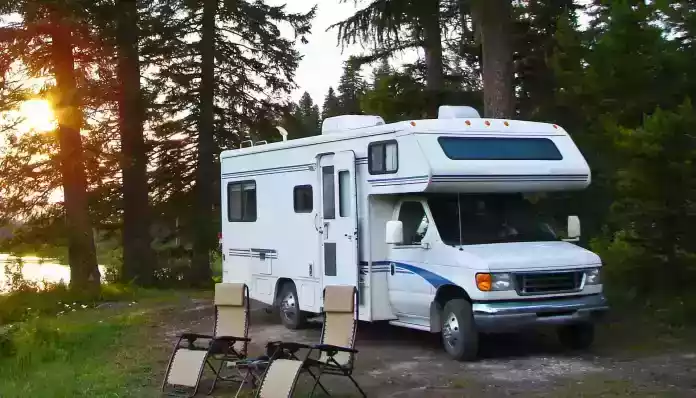Table of Contents
Introduction
RV insurance is a type of coverage specifically designed to protect recreational vehicle owners and their vehicles in the event of an accident or other unpleasant circumstances. RV insurance provides financial protection against damages, medical costs, liability claims, and more that may arise from owning and operating a recreational vehicle. It’s important to have RV insurance because it can help cover any repairs needed after an accident as well as provide additional protections for any passengers who may be injured while riding in your RV. Without this type of coverage, you could end up liable for thousands of dollars if something were to happen on the road.
Types of RV Insurance
Collision insurance is an important type of RV insurance that provides coverage for damages to your vehicle as a result of an accident. This includes both physical damage due to collision with another object and any associated costs, such as the cost to repair or replace parts damaged in the accident. Collision coverage usually comes with a deductible, which is the amount you must pay out-of-pocket before your insurer pays anything on your claim.
Liability insurance covers any legal expenses incurred if someone else makes a claim against you because of an incident involving your recreational vehicle. Liability coverage typically ranges from $ 100, 000 up to 1 million dollars depending on how much protection you want or need for yourself or other drivers in case of an accident involving your RV. It also covers medical payments for passengers who may be injured while riding in your RV, regardless of fault.
Comprehensive insurance protects you against losses caused by events other than collisions such as fire, theft, vandalism and natural disasters like floods and earthquakes. Comprehensive plans can also cover additional items such as roadside assistance and rental car reimbursement should something happen while traveling away from home in your RV.
Uninsured/Underinsured motorist (UM) coverage is designed to protect you if someone without adequate liability coverage causes damage to property or injury while operating their own vehicle and leaves without providing information needed for compensation claims processing. UM also helps cover medical bills resulting from accidents where no party has liability insurance available. For more detailed information about RV Insurances, visit https://gorving.ca/buy-an-rv/rv-insurance/
Ensuring Proper Coverages
When it comes to RV insurance, understanding the different types of coverages available is essential in order to ensure that you are properly protected. The most common types of coverage include liability, collision, comprehensive and uninsured/underinsured motorist (UM) coverage. Liability covers any legal expenses incurred if someone else makes a claim against you because of an incident involving your recreational vehicle; collision provides protection for damages caused by accidents; comprehensive protects against losses due to fire, theft or natural disasters; and UM helps cover medical bills resulting from accidents where no party has liability insurance available.
Once you have familiarized yourself with the various policies offered by your insurer, it’s time to assess your personal needs and budget. Consider what type of activities you plan on doing while traveling in your RV – this will help determine which type(s) of coverage might best suit your needs. Additionally take into account things like how often you use the vehicle or how much money it would cost to replace items such as camping equipment if they were damaged or stolen while on vacation. All these factors should be taken into consideration when selecting an appropriate policy for optimal coverage at a reasonable price point.
Getting the Best Rate
After familiarizing yourself with the different types of RV insurance available, it’s important to find a policy that fits both your budget and needs. One way to do this is by comparison shopping and getting quotes from multiple providers. This will help you compare rates and coverage options so you can make an informed decision about which policy best suits your needs. Additionally, look for discounts such as bundling other insurances or having safety features installed in your vehicle; these discounts may vary from carrier to carrier but could potentially save you money on premiums.
Another way to get the best rate is by considering a deductible – this is the amount of money you agree to pay out-of-pocket prior to receiving any benefits from the insurer. Higher deductibles mean lower premiums but also more risk if a claim needs to be made since you’ll have more out-of-pocket expenses before being reimbursed. Consider how much risk you’re willing take when deciding what deductible makes sense for you given your budget restrictions and personal preferences.
Finally, always remember that no two policies are alike – read through each one carefully so there aren’t any surprises should something happen while traveling in your recreational vehicle! Don’t hesitate asking questions of insurance agents if anything isn’t clear or if there are specific coverages not included in their standard policies; they should be able to provide advice based on individual circumstances and ensure adequate protection for both yourself and passengers in case of an unfortunate incident or accident involving your RV
Managing Claims
When it comes to managing claims, it is important to understand when and how to file a claim. Knowing when the right time is will help ensure that you receive the most compensation possible in the event of an accident or other unfortunate circumstance involving your recreational vehicle. Additionally, understanding the claims process can make filing smoother and quicker; this includes knowing what documents are needed, being aware of applicable laws within your state, and any additional information regarding benefits offered by your RV insurance policy.
Filing a claim can be a daunting task but there are certain steps you should take beforehand that may help reduce stress during this process. First off, gather all relevant documents related to the incident such as police reports, medical bills, photos of damage from an accident or vandalism if applicable – these items will need to be submitted along with your claim form so having them organized ahead of time will save time later on down the line. It’s also helpful for drivers involved in accidents to write down their accounts immediately afterwards as memories tend fade quickly over time; doing so could also provide crucial evidence needed for legal proceedings should that become necessary at some point in future due to negligence or liability disputes stemming from an incident involving one’s RV.
Finally yet importantly know your rights! Familiarize yourself with applicable privacy rights pertaining both inside and outside states where travel takes place; additionally inquire about specific coverage offered through policies taken out prior taking trips away from home. Insurance companies cannot deny valid claims but they often try – familiarizing oneself with ones own rights gives individuals more power over potential disputes which could potentially arise while attempting settle issues concerning damages incurred while operating RVs on open roads.
Conclusion
In conclusion, RV insurance is an important and necessary expense when traveling in a recreational vehicle. Understanding the various types of coverages available and how they apply to your specific situation can help ensure you are adequately protected while on the road. Liability covers legal expenses if someone else makes a claim against you; collision provides protection for damages caused by accidents; comprehensive protects against losses due to fire, theft or natural disasters; and uninsured/underinsured motorist (UM) helps cover medical bills resulting from accidents where no party has liability insurance available. Additionally, comparison shopping different policies offered by multiple carriers can help save money on premiums as well as taking advantage of any discounts such as bundling other insurances or having safety features installed in your vehicle. Finally it’s important to be aware of one’s rights when filing claims so that individuals have more power over potential disputes which could potentially arise while attempting settle issues concerning damages incurred while operating RVs on open roads. At the end of day, making sure you’re properly covered with adequate coverage will give peace-of-mind knowing both yourself and passengers are safe no matter what unexpected events may occur down line during travels away from home in recreational vehicles!









